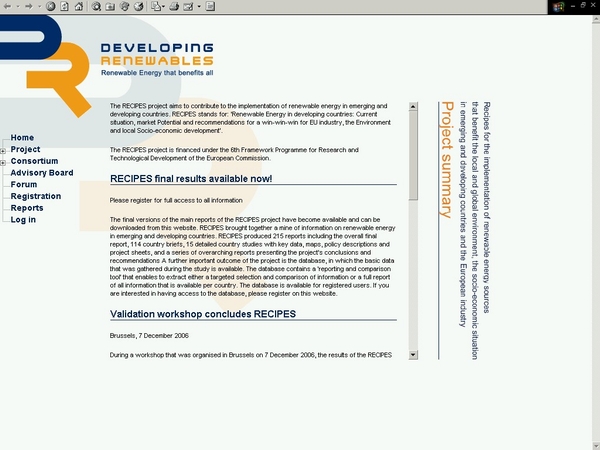Renewable energy situation, policies and programmes of five Latin American countries

During 2005 and 2006, Energy-Strategies cooperated in the RECIPES project, which has been supported by the European Commission, Directorate General Research. A team of five experts analysed the renewable energy situation, policies and programmes in five Latin American countries: Argentina, Brazil, Colombia, Mexico and Peru.
RECIPES, acronym for “Renewable Energy in emerging and developing countries: Current situation, market Potential and recommendations for a win-win-win for EU industry, the Environment and local Socio-economic development” was carried out by an international consortium lead by Prospect Consulting & Services S.A. of Belgium.
The main objective of the RECIPES project was to provide the European Commission and other stakeholders with pragmatic recommendations (and underlying analysis) facilitating appropriate action to further the implementation of renewable energy in emerging and developing countries, taking into account: (i) the effects on the local socio-economic situation, (ii) the competitive position of European renewable energy industry and (iii) the impacts on the local and global environment.
In pursuit of these objectives, technical and market potentials of various renewable energy technologies have been established for 114 countries world-wide, with 15 countries studied in more detail. The results have been compared to other studies and conclusions and recommendations have been validated with stakeholders.
The contribution of Energy-Strategies was to provide detailed information and analysis on the renewable energy situation, policies and programmes in five Latin American countries: Argentina, Brazil, Colombia, Mexico and Peru. For each country, the following information was elaborated:
Part A:
- Detailed information on the country’s energy sector, energy prices, socio-economic indicators, data on energy production, use and efficiency, renewable energy targets and expansion plans, renewable energy industry in the country, energy production and consumption forecasts;
- Biomass overview: data on agriculture and agro industry, crop waste, wood and refuse;
- Information concerning the technical and economic potential, market, cost and emissions of the following technology-market combinations: solar thermal energy for residential buildings, photovoltaic electricity, wind power, geothermal electricity and heat, small and large hydro power, electricity and heat from biomass, biofuels from energy crops, small RE systems (solar cookers, micro hydro power, small bio digesters, solar water heaters, small wind turbines), industrial RE systems (solar dryers, waste combustion, geothermal low-enthalpy heat), seawater desalination. Where applicable, distinction was made between grid-connected and stand-alone systems.
Part B: Review of renewable energy policies and programmes.
Part C: Country maps.
Part D: Information of renewable energy projects realized in the country.
Part E (not published): Interviews with stakeholders.
Both AES and ESENERG were partners in the consortium. Collaborating experts were:
Odón de Buen (Mexico), Henry García (Peru), Wolfgang F. Lutz (Colombia, Peru, Mexico; coordination), Victorio Oxilia (Argentina, Brazil), Omar Prias (Colombia).
For more information please contact the director of Energy-Strategies Wolfgang F. Lutz.
April 2007
